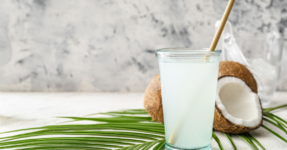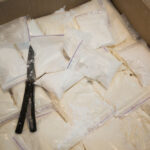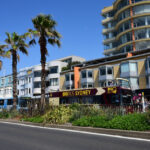The Offence of Importing a Commercial Quantity of Border Controlled Drugs into Australia

In an operation involving law enforcement agencies from several countries, a commercial quantity of liquid methamphetamine concealed in containers marked as ‘A Be Coco Coconut Water’ and allegedly headed for New South Wales has been seized in Hong Kong.
According to the Australian Federal Police (AFP) and Australian Border Force (ABF), the shipment contained 1.8 tonnes of the border controlled drug, which represents a wholesale value of $540 million and street value of $1.62 billion.
AFP Detective Superintendent Patrick Gordon, a senior officer in Mexico, said in a statement:
“This amount of meth could have been sold as about 18 million street-level deals, so the New South Wales and Australian community is safer because these drugs were seized.”
Methamphetamine consumption on the rise
Mexico’s drug cartels were once heavy suppliers of naturally grown drugs such as cannabis and opium but have, in light of trends towards the legalisation of cannabis, increased production of more refined drugs such as methylamphetamine, which is made in urban laboratories and can be more difficult to detect.
For its part, Australia has a ready source of customers who are willing to pay big bucks for the substance. A report by Australian Criminal Intelligence Commission (ACIC), released in 2021, found that methamphetamine consumption in Australia is the highest per capita when compared with nations in Europe, Asia and Oceania.
The report, which was based on wastewater samples from 56 regional and metropolitan sites across Australia covering 13 million people, compared drug consumption between different states and territories over a specific period. It also included updated data from 129 cities globally.
Methamphetamine use
Methylamphetamine is commonly used in small doses to treat Attention Deficit-Hyperactivity Disorder (ADHD).
On the streets as a recreational drug, it is also known as ‘ice’ or ‘speed’.
It is usually colourless and odourless. It is highly addictive and can have severely adverse health effects on those who become heavily dependent on the substance.
When unregulated, purity levels of the drug can vary enormously and toxic fillers can often be added, increasing the risk of overdose and even death.
Resources finally allocated to addressing ‘ice addiction’
Just last month, the New South Wales Government finally issued a response to the landmark report it commissioned on ice addiction across the state.
The response came more than two years after the final report was handed down.
The government has announced it will be allocating $500 million to deliver health and justice reforms based on the report’s recommendation.
$358 million will be allocated to address treatment gaps and more than $141 million to prioritise offenders with intensive health intervention and better address underlying causes of offending.
While the NSW government stopped short of decriminalizing low-level personal drug use, – a a key recommendation – NSW Premier Domenic Perrottet said the investment is aimed at breaking the cycle of drug use and this includes plans to expand the Sydney Drug Court from one to five days a week and better resource the Magistrates Early Referral Into Treatment (MERIT) program.
Drug use should be treated as a health issue, not a criminal law problem
While the investment is an important step forward, those who work with people who are dependent on the substance say the reforms don’t go far enough to tackle the issue.
As drug possession is a crime in New South Wales, dependence is inextricably linked to criminal offending, and those who are addicted often commit other crimes – such as crimes against property – to feed their habits.
That being so, there are calls to decriminalise the possession of small quantities of illicit drugs for personal use, whatever the drugs may be, and focus on helping those who are dependent rather than criminalising them and bringing them into a cycle of criminality.
Such a move has had positive social and health effects in a number of other nations, as well as saved tens of millions of dollars per year in law enforcement costs.
Whether our governments will go that way is yet to be seen.
The Offence of Importing a Commercial Quantity of Border Controlled Drugs into Australia
Importing a commercial quantity of a border controlled drug is an offence under section 307.1 of the Criminal Code Act 1995 (Cth) which carries a maximum penalty of life in prison.
To establish the offence, the prosecution must prove beyond reasonable doubt that:
- You intentionally imported a substance,
- The substance was a commercial quantity of a border controlled drug or plant, and
- You knew or were reckless as to whether the substance was a border controlled drug or plant
‘Import’ includes to bring into Australia, and to deal with the substance in connection with its importation.
You were ‘reckless’ if you were aware there was a substantial risk the substance was a border controlled drug or plant but went ahead with your actions regardless.
Examples of ‘commercial quantities’ include:
- At least 500 grams of MDMA (or ‘ecstacy’),
- At least 750 grams of amphetamines,
- At least 1.5 kgs of heroin,
- At least 2 kgs of cocaine, and
- At least 100 kgs of cannabis leaf.
Legal defences
In addition to bearing the onus of proving the essential elements (or ingredients) of the offence, the prosecution must also disprove beyond reasonable doubt any legal defence that arises from the evidence in the case.
If the prosecution is unable to do so, you are entitled to an acquittal.
The most frequently-used defence to the drug importation charges is ‘duress’, which is where:
- Your actions were due to a threat of death or serious injury to you, a member of your family or someone else close to you,
- There was no reasonable way for you to render the threat ineffective, and
- Your conduct was a reasonable response to the threat
Going to court for a serious drug charge?
If you have been accused of a serious drug offence, contact Sydney Criminal Lawyers to secure the strongest possible defence from a team renowned for defending and winning complex and difficult drug cases.
Our profession-leading drug defence team will accurately advise you in relation to your case, explain your options and the best way forward, and use our decades of experience to fight for the optimal outcome.
Our team is consistently able to have drug charges withdrawn or thrown out of court in circumstances where others are not, and our track record includes success in dozens of commercial drug importation cases.
So call us on (02) 9261 8881 and have Sydney’s best defence team on your side.








